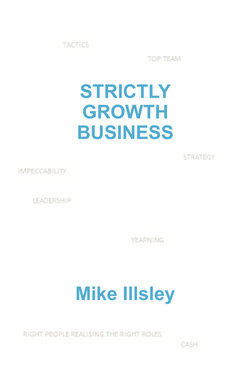Читать книгу STRICTLY GROWTH BUSINESS - Mike Illsley - Страница 6
На сайте Литреса книга снята с продажи.
CHAIRMAN AND CHIEF EXCUTIVE OFFICER
ОглавлениеThe two key strategy executives in a business are the strategic business unit (SBU) manager and the investors representative. The SBU manager can have a variety of titles such as general manager, managing director, product line director and others. For the sake of brevity this book uses the title Chief Executive Officer or CEO.
The CEO is that person with the day to day operational responsibility for the performance of the strategic business unit as well assole control of all the functions that drive that unit. Both elements must exist for the CEO to be effective.
The investors representative is usually the chairman of the owning corporation but, as in the case of merchant investment houses, is sometimes a non-executive director. In start-up and privately owned businesses the CEO is often his own chairman. As a business grows even the individualistic proprietor generally finds it necessary to include a second key executive, especially as extra capital is sought for expansion.
It is critical for success that the role of the CEO is clearly understood by all involved and that there are absolutely no overlaps of responsibility with any other executive elsewhere in the organisation. The CEO is the captain of the ship, solely in command and seen to be solely in command. If such a person cannot be identified in the organisation then the chairman’s first task is to change that organisation and appoint one. There simply has to be a single CEO with performance responsibility together with control of all the business functions for any strictly growth business to function.
The CEO needs to be a leader with the focus and determination to win. Leaders inspire people and empower them to realise almost impossible goals. Leaders are good communicators, listening as well as talking, ensuring mutual understanding and clearly enunciating ideas and instructions. Precise communication is a primary skill of the CEO.
Leaders can be very intelligent but it is more important for the CEO to be wise. Wisdom comes from experience and requires intelligence coupled with the ability to listen, to consider, to learn and to understand human behavior. Wisdom enables the CEO to make good decisions at the right time.
The Chairman’s role is to ensure a long term return on investment for the shareholders, to ensure the business continues to encompass all the eight elements of the strictly growth business and to ensure that the CEO is tactically successful. This is a purely strategic role.
The chairman should maintain an active knowledge of the business environment in order to supervise the CEO and monitor the strength of the top executives. If the business fails to grow through good tactical management it is the chairman’s responsibility to fire the CEO.
The CEO is solely concerned with delivering the CDSV. The Chairman has a broader remit and must consider selling the business and moving into alternative markets that are likely to be a better long term investment for the shareholders.
The CEO is concerned with the medium term. The Chairman is concerned with the long term.
There has to be a mutually sympathetic relationship between these two executives. The strategic debate between these two is central to success and should remain a private issue. They might well mutually agree to involve others in that debate at critical times, but generally the privacy of their regular debate about the strategic situation and business progress towards its CDSV should be sacrosanct. These two, acting together, will have their own agenda, particularly relating to the top executives. It is these two who effectively ensure all that all the eight aspects of the strictly growth business remain ever present.
